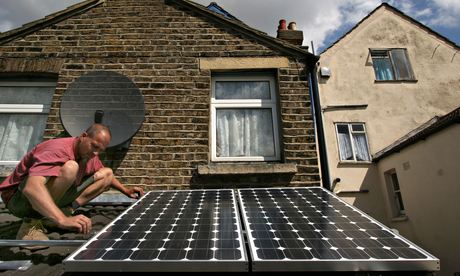
The domestic renewable heat incentive (RHI), which was first proposed in 2010, was finally launched this week. Ministers say it is the first scheme of its kind in the world offering financial incentives to householders to install low-carbon heating systems. So do the figures add up for householders?
Who is it for?
It's open to everyone, but the upfront and running costs of the technologies mean it will be most attractive to those living in the country who are off the main gas system and rely on oil, liquid gas or electricity for heating. The RHI differs from the feed-in tariffs for solar panels – which pay for electricity generated as well as exported to the national grid – by paying just for the energy predicted to be saved by their introduction.
What will replace my heating system?
Qualifying technologies include biomass boilers that burn wood, wood chips or pellets; roof-mounted solar thermal systems that only provide hot water; and ground or air-source heat pumps which draw heat from warmth underground or from the air.
How do I qualify?
Homeowners will have to pay for an assessment, which typically costs £100-£150, and must use accredited systems and installers to get the cash. You will need basic insulation in place to qualify for the payments.
How much will it cost?
The simplest measure is a solar water system that typically costs £4,000-£5,000 to install and should provide most of a home's hot water for large parts of the year. Under the terms of the RHI, homes installing these will receive 19.2p per kilowatt hour, calculated according to a formula rather than based on actual consumption.
The Solar Trade Association says a typical four-occupant house will receive around £315 a year – or £2,200 in RHI payments over the seven years of the scheme – equal to around half the cost of the system. It estimates it could save a household £11,000 over its 25-year life, assuming they are no longer using an oil-fired boiler to heat their water.
Biomass boilers typically cost £15,000-£20,000 to install and allow users to do away with their conventional oil-fired boiler. The downside is that they require significant space, not just to house the kit itself, but also the wood or pellets waiting to be burned.
Installing households will receive a typical annual income of £2,200 per year or £15,400 over the life of the tariff in RHI payments, as well as saving the £2,000-£3,000 they currently pay for oil, gas or electricity to heat their home. That assumes a usage of around 18,000 kW/h per year heating the home and hot water. If you have your own supply of wood, the savings will be substantial. Otherwise, the cost of buying in wood or pellets, although much greener, is comparable with the cost of mains gas.
Air-source heat pump systems typically cost £10,000-£14,000 to install and will generate an annual income of just over £1,000 a year in RHI payments for seven years. Savings aren't so great – typically £700-£800 a year, as the pumps require considerable electricity to run, but again, it will depend on what users currently spend on heating.
How will I be paid?
The energy regulator Ofgem is managing the RHI system and will send households the money. The RHI is paid tax-free each quarter for seven years, rising in line with inflation each year.
Around 18,000 households who have installed systems since July 2009 are already eligible to start receiving the payments.
Cathy Debenham, who runs the renewables advice website YouGen, says: "Its aim is to enable renewable heating systems to compete on a level playing field with fossil fuel ones. The payments compensate the owner for the price difference between the two, including the cost of borrowing money to pay for installation."
She cautions that people should make sure technologies are right for their property before switching. "Not all renewable heating is appropriate for every property. Heat pumps run at much lower temperatures than a standard boiler, and so they are most suited to well-insulated buildings, ideally those with underfloor heating."
"Biomass boilers are significantly bigger than an oil boiler and will need more space, plus space to store the fuel, which must be kept dry. Solar thermal panels are not much use if you have electric showers, as most of the hot water they generate won't be used."
Oftec, the oil heating industry's trade body, said the high upfront costs of many of the technologies made the RHI "only fit for the wealthy few".
The scheme has been welcomed by one Berkshire man, Bernhard Garside, who recently paid Ecovision to install a £14,000 air-source heat pump system. "Under the new domestic RHI I will receive an annual payment of at least £1,000. When I add this to the £2,500 savings I was previously paying for oil to run my expensive and very inefficient oil-fired boiler, I am saving at least £3,500 a year," he says, although he will see increased electricity costs of £980.
"When I weighed up the cost of anything between £2,500 and £3,500 to replace my old oil-fired boiler, which was well past its sell-by date, plus the annual cost of the oil to run it, this would have been completely dead money," he says.

